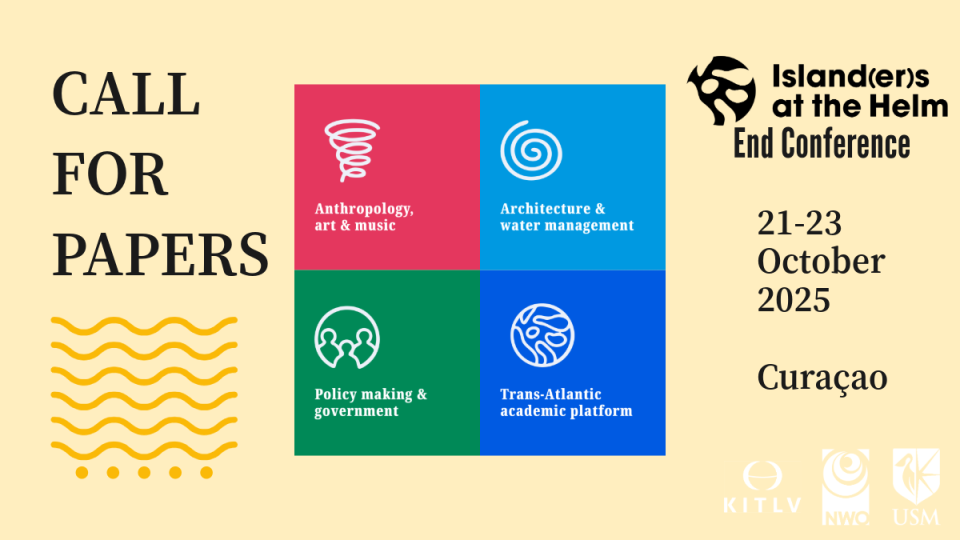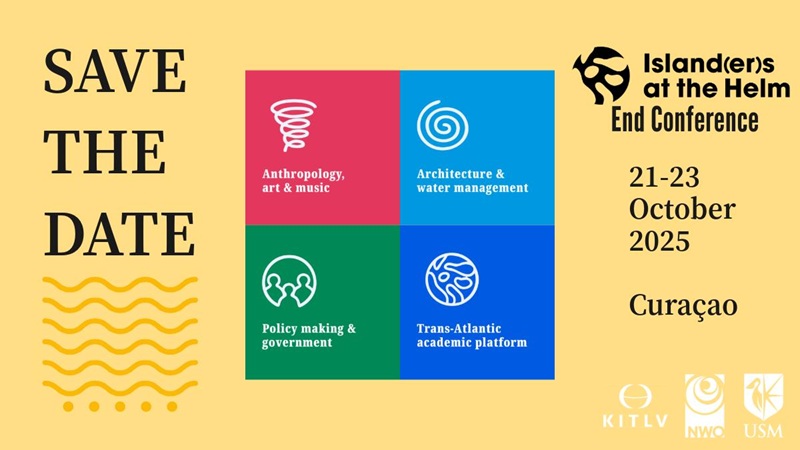26-02-2025
The Island(er)s at the Helm research project invites scholars, practitioners, and artists to submit abstracts for its upcoming conference dedicated to exploring the intersections of cultural, heritage, climate challenges, policy, governance, and sustainable adaptation in the (Dutch) Caribbean.
Read more about Island(er)s at the Helm
Important dates
Conference dates: 21-23 October 2025.
Deadline submissions: 31 March 2025.
Call for papers
This interdisciplinary gathering will take place in Curaçao (location to be confirmed) from the 21 until 23 October 2025, and will showcase innovative strategies for addressing environmental challenges while emphasizing the unique epistemological position of island communities and islanders.
This conference aims to explore the significance of transdisciplinary research within the context of Caribbean climate change and future imaginaries, focusing on how Caribbean scholars, climate activists engage with and are informed by Caribbean diasporic epistemological practices that reflect their unique environmental socio-political landscapes.
We invite reflective works on the concept of poetics, policy, governance, research, architecture, development, encouraging exploration of aesthetics, writers' voices, imaginaries, and the shifting narratives of Caribbean futures. Abstracts may focus on any area of the Caribbean and may explore these questions in relation to the evolving environmental, cultural, and political dynamics of the region.
Call for papers #1: (Dutch) Caribbean climate poetics: Islander voices, aesthetics, imaginaries, and futures
The conference partly seeks to illuminate the ways in which anthropology, ethnography, and the visual and performing arts, as modes of inquiry, contribute to cultural transmission, community empowerment, and sustainable adaptation in the face of climate challenges and events. Participants are encouraged to engage with questions of how Islanders’ knowledge-practices, creative expressions, and popular culture can drive other ways of being in and of the archipelago for climate research in complex postcolonial contexts. Popular cultural expressions and popular media play a role in amplifying climate challenges and experiences.
We welcome presentations which question arts as a lens for climate knowledge, examining the potential visual and performing arts have as mediums and epistemologies for exploring environmental challenges. Moreover, papers may also reflect on artistic responses to natural hazards and disasters, technology, and sustainable development. Such papers will foster broader discussions on transdisciplinary approaches to Caribbean climate research. In doing so, we can bridge social sciences, arts, and natural sciences to address climate challenges, present educational frameworks integrating creative methodologies and islander knowledges, and create collaborative methods for fostering socio-, cultural-ecological conversations.
We invite papers that address questions such as:
- What does “poetics” mean for Caribbean climate scholars in the face of climate change?
- How can a researcher’s knowledge generation be defined in relation to the environmental crises?
- Can we speak of a distinct Caribbean transdisciplinary methodological approach that engages with ecological and political concerns?
- What is the connection between poetics, governance, development and politics in shaping Caribbean futures?
- How have the notions of anthropology, archaeology, policy, urban development, and governance evolved across Caribbean climate research academic discourse?
Call for papers #2: The politics of climate governance
This conference also seeks to investigate the important connections between climate change and its economic, political, religious, and cultural impact on the everyday lives of society in the contemporary Caribbean. Visions of resilience, adaptation, and survival are shaped by political, economic, cultural, and spiritual dimensions. That is why climate change is not only a material reality, but also a foil for contested future imaginaries. We thus aim to interrogate how communities conceptualise, narrate, and experience climate transformations.
By bringing together scholars, writers, activists, community voices, and representatives from various fields and approaches, this call aims to foster interdisciplinary conversations and a more nuanced understanding of how climate governance and globalised political processes either enable, constrain, hinder, or neutralise communities’ capacity to act and adapt in the face of climate challenges. Overall, the conference aims to move beyond conventional policy discourse to centre alternative visions, transnational or multi-sited analyses, justice-driven frameworks, and collaborative approaches to climate adaptation.
Papers that bridge the gap between the past, present, and future; between social sciences and environmental governance; and between policymakers and communities while engaging communities as active participants in shaping climate futures are especially welcome. Our goal is to facilitate discussions that enhance public participation, knowledge sharing, and critical engagement while addressing the multidimensional realities in an ecologically rapidly changing world.
To that end, we invite scholarly contributions that critically explore questions such as:
- How do local and global shifts reshape social and political imaginaries of the future?
- How do communities experience and navigate the shifting realities of local and global changes in relation to climate?
- What political, cultural, or social narratives, languages, and knowledge systems are emerging to frame/articulate uncertain climate futures?
- How do structures of today and visions for the future link to the historical past of the region?
- In what ways do supranational, Caribbean, and metropolitan policies engage—or fail to engage—with local aspirations and needs, and in what ways do they contribute to the vulnerabilisation of Caribbean communities?
- How does climate change expand economic and social vulnerabilities amid existing societal rifts?
- How do public policymakers in the Caribbean and beyond engage with and respond to the urgent needs of communities in the context of climate change?
- What strategies are being implemented to create more inclusive, adaptive, and equitable policies?
Submission Guidelines
We welcome abstracts that engage with these themes through various disciplinary and creative approaches, including:
- Academic research papers.
- Policy analyses and case studies.
- Artistic and creative submissions (performances, visual art, multimedia installations).
- Applied interventions in education, technology, and governance.
We invite you to be part of a dynamic and engaging conversation at the nexus of cultural practice, arts, and climate adaptation. Submit your abstract and help shape islanders futures for the (Dutch) Caribbean and beyond.
Submissions must include:
- Title of the presentation.
- A 300–500-word abstract detailing the scope, methodology, and anticipated contributions.
- Author(s)’ name(s), institutional affiliation(s), and contact details.
- Please fill in this form
Deadline for abstract submission
31 March 2025
Notification of Acceptance
1 May 2025
Contact
For inquiries and submissions, please contact:
- Dr. Charissa Granger for questions regarding call #1: (Dutch) Caribbean climate poetics: Islander voices, aesthetics, imaginaries, and futures:
charissa.granger@uwi.edu - Dr. Yvette Ruzibiza for questions regarding call #2: The politics of climate governance:
ruzibiza@kitlv.nl - Yayah Siegers Samaniri for organizational and logistical questions:
siegers@kitlv.nl

